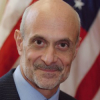Michael Chertoff

Michael Chertoff
Michael Chertoffis an American attorney who was the second United States Secretary of Homeland Security under Presidents George W. Bush andBarack Obama, and co-author of the USA PATRIOT Act. He previously served as a judge on the United States Court of Appeals for the Third Circuit, as a federal prosecutor, and as Assistant U.S. Attorney General. He succeeded Tom Ridge as United States Secretary of Homeland Security on February 15, 2005...
NationalityAmerican
ProfessionPublic Servant
Date of Birth28 November 1953
CountryUnited States of America
I define control to mean that we will have an extremely high probability of detecting, responding to and interdicting illegal crossings of our borders.
I can't tell you what the numbers are going to be, but I think we need to prepare the country for what's coming.
I don't think there's a lack of a sense of urgency,
Don has the leadership, ideas and optimism that the residents of the Gulf Coast Region deserve,
Then first stage is, of course, life saving, ... We've made a lot of progress in that respect.
That's one of the issues we have to look at.
That is unacceptable and we are going to change that immediately.
It's important to allow the new people who have the responsibility ... to have access to the information we need to do better, ... We don't want to sacrifice the real ability to get a full picture of Mike's experiences; we don't want to sacrifice that ability simply in order to make an image point.
I want to have the people who are present here on the ground
once and for all .Ê.Ê. rather than simply going out and buying a lot of newfangled gadgets.
once and for all . . . rather than simply going out and buying a lot of newfangled gadgets.
Not only did they offer their prayers, but their resources as well,
absolutely an appropriate response while this and other intelligence information continued to be examined and analyzed.
It's as if an atomic bomb was dropped,